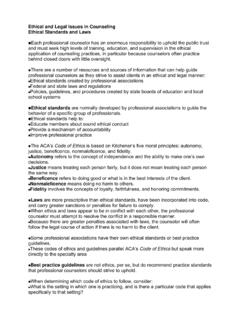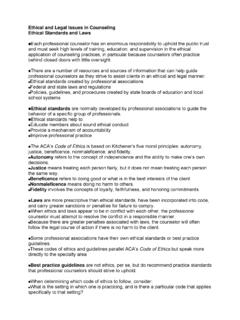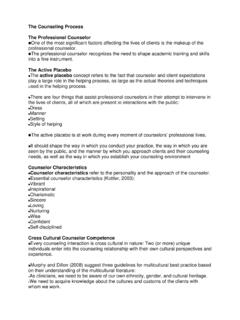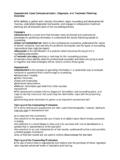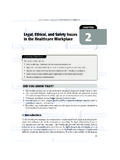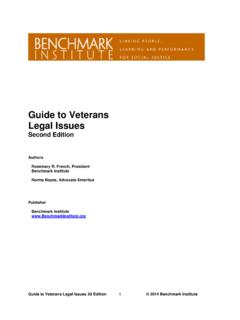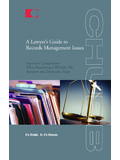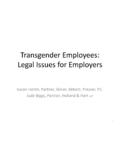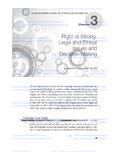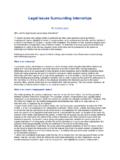Transcription of Ethical and Legal Issues in Counseling Ethical …
1 Ethical and Legal Issues in Counseling Ethical Standards and Laws Each professional counselor has an enormous responsibility to uphold the public trust and must seek high levels of training, education, and supervision in the Ethical application of Counseling practices, in particular because counselors often practice behind closed doors with little oversight. There are a number of resources and sources of information that can help guide professional counselors as they strive to assist clients in an Ethical and Legal manner: Ethical standards created by professional associations Federal and state laws and regulations Policies, guidelines, and procedures created by state boards of education and local school systems Ethical standards are normally developed by professional associations to guide the behavior of a specific group of professionals.
2 Ethical standards help to: Educate members about sound Ethical conduct Provide a mechanism of accountability Improve professional practice The ACA s Code of Ethics is based on Kitchener s five moral principles: autonomy, justice, beneficence, nonmaleficence, and fidelity. Autonomy refers to the concept of independence and the ability to make one s own decisions. Justice means treating each person fairly, but it does not mean treating each person the same way. Beneficence refers to doing good or what is in the best interests of the client.
3 Nonmaleficence means doing no harm to others. Fidelity involves the concepts of loyalty, faithfulness, and honoring commitments. Laws are more prescriptive than Ethical standards, have been incorporated into code, and carry greater sanctions or penalties for failure to comply. When ethics and laws appear to be in conflict with each other, the professional counselor must attempt to resolve the conflict in a responsible manner. Because there are greater penalties associated with laws, the counselor will often follow the Legal course of action if there is no harm to the client.
4 Some professional associations have their own Ethical standards or best practice guidelines. These codes of ethics and guidelines parallel ACA s Code of Ethics but speak more directly to the specialty area Best practice guidelines are not ethics, per se, but do recommend practice standards that professional counselors should strive to uphold. When determining which code of ethics to follow, consider: What is the setting in which one is practicing, and is there a particular code that applies specifically to that setting?
5 Ethical & Legal Issues In what capacity ( , licensed professional counselor, marriage and family therapist, certified school counselor) is the professional operating? ACA Code of Ethics The most recent edition of the ACA Code of Ethics was published in 2005. The Code addresses the responsibilities of professional counselors toward their clients, colleagues, workplace, and themselves by delineating the ideal standards for conducting one s behavior. All ACA members must abide by the Code. The Code has eight sections: A) The Counseling Relationship, B) Confidentiality, Privileged Communication, and Privacy, C) Professional Responsibility, D) Relationships with Other Professionals, E) Evaluation, Assessment, and Interpretation, F) Supervision, Training, and Teaching, G) Research and Publication, and H) Resolving Ethical Issues .
6 Highlights from each of these areas will be summarized, but students should locate the actual ACA Code of Ethics on the ACA web site and peruse it in great detail. Section A: The Counseling Relationship Counselors must wait five years after the counselor-client relationship has ended before engaging in any romantic or sexual relations with a client, a client s family members, or a client s romantic partner. Avoidance of nonprofessional relationships with clients is not always possible, and may even be beneficial ( , attending formal ceremonies, hospital visits, membership in community organizations, commerce), albeit when conducted with caution.
7 Informed consent includes, but is not limited to: Purposes, goals, techniques, procedures, limitations, potential risks, and benefits of services; the counselor s qualifications, credentials, and relevant experience; the intended use of tests and reports, fees, and billing arrangements; the right to confidentiality and limitations; continuation of services should the counselor become incapacitated; obtain clear information about their records; participate in ongoing treatment planning; and right to refuse treatment at any time and the potential consequences for doing so.
8 Balance assent from minors and those incapable of giving consent with those of parents and family members who hold the Legal rights of consent, protection, and decision making on their behalf. Section B: Confidentiality, Privileged Communication, and Privacy Be respectful of differing views and inform clients with whom, when, and how information will be shared. Take precautions to ensure confidentiality when using technologies such as computers, electronic mail, or voicemail. Maintain the confidentiality of deceased clients as is consistent with Legal requirements and policies.
9 Ethical & Legal Issues Inform parents and Legal guardians of the confidential nature of the Counseling relationship as well as establish a working relationship with them in order to better serve clients. Section C: Professional Responsibility Be alert to signs of personal impairment and refrain from providing or offering services if the impairment could potentially harm a client. Assist supervisors or colleagues in recognizing impairment and if necessary, provide assistance, intervention, or consultation. Designate a specific colleague or records custodian and create a proper plan for file and client transfer in the case of incapacitation, termination of practice, or death.
10 Use techniques, modalities, or procedures that have a scientific or empirical foundation and are grounded in theory. Otherwise, techniques must be labeled as unproven or developing. Section D: Relationships with Other Professionals Become knowledgeable about colleagues and develop positive working relationships and communication systems. Be respectful of differing approaches to Counseling services as well as the traditions and practices of other professional groups. Work to develop and strengthen relations with interdisciplinary colleagues.
